Devansh Gupta
Memory-Efficient Differentially Private Training with Gradient Random Projection
Jun 18, 2025Abstract:Differential privacy (DP) protects sensitive data during neural network training, but standard methods like DP-Adam suffer from high memory overhead due to per-sample gradient clipping, limiting scalability. We introduce DP-GRAPE (Gradient RAndom ProjEction), a DP training method that significantly reduces memory usage while maintaining utility on par with first-order DP approaches. Rather than directly applying DP to GaLore, DP-GRAPE introduces three key modifications: (1) gradients are privatized after projection, (2) random Gaussian matrices replace SVD-based subspaces, and (3) projection is applied during backpropagation. These contributions eliminate the need for costly SVD computations, enable substantial memory savings, and lead to improved utility. Despite operating in lower-dimensional subspaces, our theoretical analysis shows that DP-GRAPE achieves a privacy-utility trade-off comparable to DP-SGD. Our extensive empirical experiments show that DP-GRAPE can reduce the memory footprint of DP training without sacrificing accuracy or training time. In particular, DP-GRAPE reduces memory usage by over 63% when pre-training Vision Transformers and over 70% when fine-tuning RoBERTa-Large as compared to DP-Adam, while achieving similar performance. We further demonstrate that DP-GRAPE scales to fine-tuning large models such as OPT with up to 6.7 billion parameters.
A Stochastic Optimization Framework for Private and Fair Learning From Decentralized Data
Nov 12, 2024



Abstract:Machine learning models are often trained on sensitive data (e.g., medical records and race/gender) that is distributed across different "silos" (e.g., hospitals). These federated learning models may then be used to make consequential decisions, such as allocating healthcare resources. Two key challenges emerge in this setting: (i) maintaining the privacy of each person's data, even if other silos or an adversary with access to the central server tries to infer this data; (ii) ensuring that decisions are fair to different demographic groups (e.g., race/gender). In this paper, we develop a novel algorithm for private and fair federated learning (FL). Our algorithm satisfies inter-silo record-level differential privacy (ISRL-DP), a strong notion of private FL requiring that silo i's sent messages satisfy record-level differential privacy for all i. Our framework can be used to promote different fairness notions, including demographic parity and equalized odds. We prove that our algorithm converges under mild smoothness assumptions on the loss function, whereas prior work required strong convexity for convergence. As a byproduct of our analysis, we obtain the first convergence guarantee for ISRL-DP nonconvex-strongly concave min-max FL. Experiments demonstrate the state-of-the-art fairness-accuracy tradeoffs of our algorithm across different privacy levels.
Stochastic Differentially Private and Fair Learning
Oct 17, 2022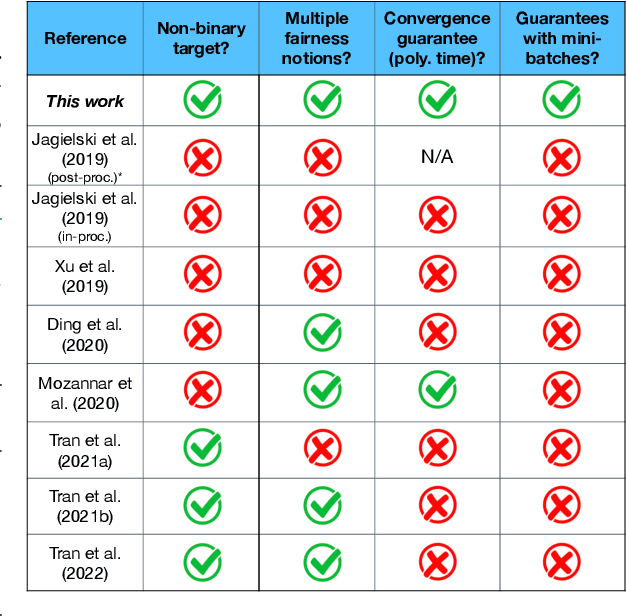
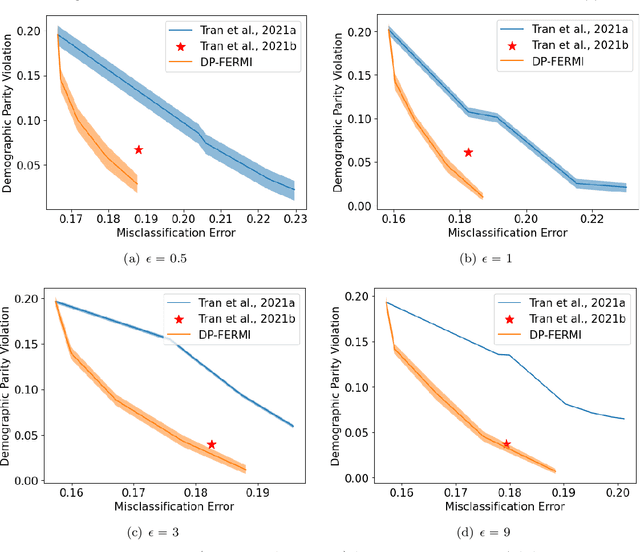
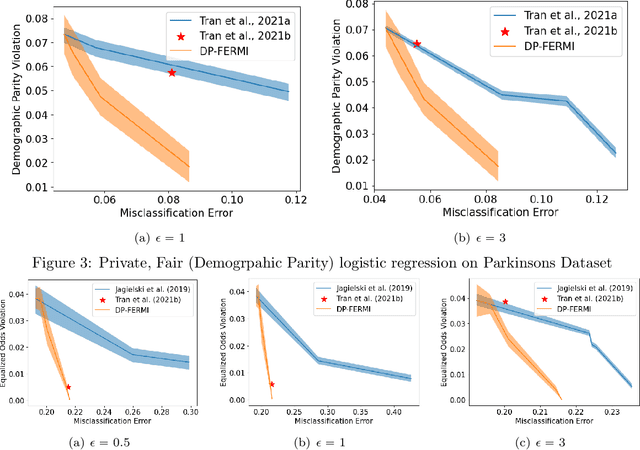
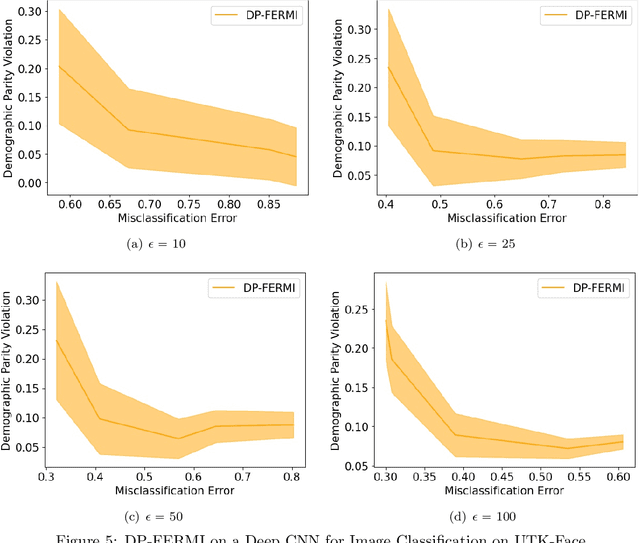
Abstract:Machine learning models are increasingly used in high-stakes decision-making systems. In such applications, a major concern is that these models sometimes discriminate against certain demographic groups such as individuals with certain race, gender, or age. Another major concern in these applications is the violation of the privacy of users. While fair learning algorithms have been developed to mitigate discrimination issues, these algorithms can still leak sensitive information, such as individuals' health or financial records. Utilizing the notion of differential privacy (DP), prior works aimed at developing learning algorithms that are both private and fair. However, existing algorithms for DP fair learning are either not guaranteed to converge or require full batch of data in each iteration of the algorithm to converge. In this paper, we provide the first stochastic differentially private algorithm for fair learning that is guaranteed to converge. Here, the term "stochastic" refers to the fact that our proposed algorithm converges even when minibatches of data are used at each iteration (i.e. stochastic optimization). Our framework is flexible enough to permit different fairness notions, including demographic parity and equalized odds. In addition, our algorithm can be applied to non-binary classification tasks with multiple (non-binary) sensitive attributes. As a byproduct of our convergence analysis, we provide the first utility guarantee for a DP algorithm for solving nonconvex-strongly concave min-max problems. Our numerical experiments show that the proposed algorithm consistently offers significant performance gains over the state-of-the-art baselines, and can be applied to larger scale problems with non-binary target/sensitive attributes.
FaIRCoP: Facial Image Retrieval using Contrastive Personalization
May 28, 2022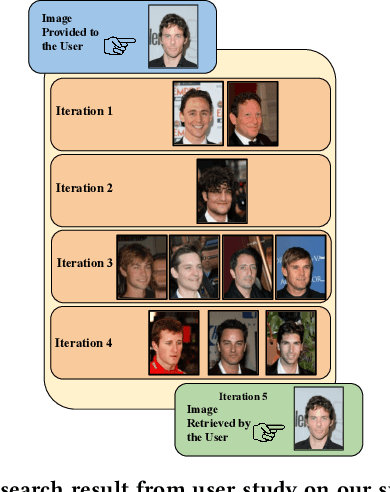
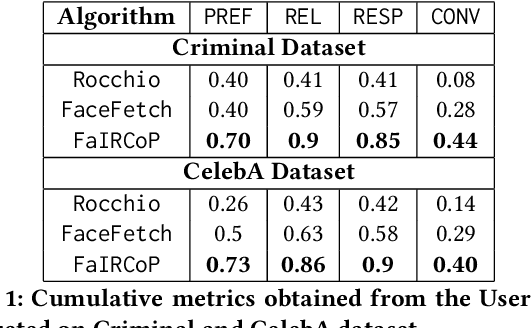


Abstract:Retrieving facial images from attributes plays a vital role in various systems such as face recognition and suspect identification. Compared to other image retrieval tasks, facial image retrieval is more challenging due to the high subjectivity involved in describing a person's facial features. Existing methods do so by comparing specific characteristics from the user's mental image against the suggested images via high-level supervision such as using natural language. In contrast, we propose a method that uses a relatively simpler form of binary supervision by utilizing the user's feedback to label images as either similar or dissimilar to the target image. Such supervision enables us to exploit the contrastive learning paradigm for encapsulating each user's personalized notion of similarity. For this, we propose a novel loss function optimized online via user feedback. We validate the efficacy of our proposed approach using a carefully designed testbed to simulate user feedback and a large-scale user study. Our experiments demonstrate that our method iteratively improves personalization, leading to faster convergence and enhanced recommendation relevance, thereby, improving user satisfaction. Our proposed framework is also equipped with a user-friendly web interface with a real-time experience for facial image retrieval.
 Add to Chrome
Add to Chrome Add to Firefox
Add to Firefox Add to Edge
Add to Edge